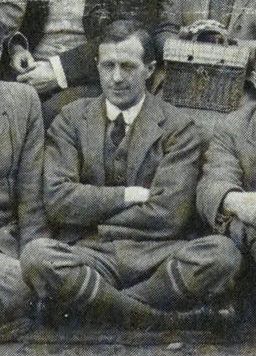Related Research Articles
Thomas William Pierrepoint was an English executioner from 1906 until 1946. He was the brother of Henry Pierrepoint and uncle of Albert Pierrepoint.

The British Mycological Society is a learned society established in 1896 to promote the study of fungi.
Thomas Hyde Villiers was a British politician from the Villiers family.

George Edward Massee was an English mycologist, plant pathologist, and botanist.

Arthur Anselm Pearson was an English mycologist. He often published under the name A. A. Pearson. The standard author abbreviation A.Pearson is used to indicate this person as the author when citing a botanical name.

Charles Crossland was an English mycologist.

Thomas Edward Wilkinson (1837−1914), known as Edward Wilkinson, was an Anglican bishop, legionnaire and travel writer in the late 19th and early 20th centuries. The sixth child of a gentleman farmer, he was born at Walsham Hall, Walsham le Willows, Suffolk. Before he was ordained, he joined the French Foreign Legion and travelled around Europe.

West Park United Reformed Church is located in the West Park area of Harrogate, England, and is a Grade II listed building. It was designed in Nonconformist Gothic style as West Park Congregational Church by Lockwood & Mawson and completed in 1862 for around £5,000. Along with Belvedere Mansion across the road, it was intended as part of the prestigious entrance to the Victoria Park development. For the Congregationalists it was meant to house an increasing congregation of visitors brought to the spa town by the recently-built railways. It became a United Reformed church in 1972.
The International Mycological Association (IMA) is a professional organization that promotes mycology, the study of fungi. It was founded in 1971 during the first International Mycological Congress, which was held in Exeter (UK).

Louise Wright was a fashion illustrator. Four of her six siblings were also professional artists. They were all born in Leeds, and almost all of them later moved to London.
Gilbert Scott Wright was an English painter. Like his older brother George Wright, he painted hunting and coaching scenes, as well as horse portraits. Wright was one of a family of seven children, five of whom were professional artists, either principally as painters, or as illustrators.
George Wright was a painter in oils whose subjects were mainly drawn from hunting, with which he was familiar, being a fox-hunter himself, coaching and other equestrian topics. George Wright was one of the foremost equestrian artists of his time. He was one of a family of seven children, five of whom were professional artists, either principally as painters, or as illustrators.

Seth Lister Mosley FES (1848–1929) was an English naturalist, ornithologist and curator who lived in Huddersfield, West Yorkshire. Born into a working-class family, he had little in the way of formal education.
Thomas William Woodhead (1863–1940) was an English plant ecologist. He was early proponent of ecology, who helped the growth of plant ecology as a discipline in England, and later became Professor of Biology at Huddersfield Technical College. He was also a pioneer of pollen analysis.
The Yorkshire Mycological Committee is a committee within the Yorkshire Naturalists' Union. First formed in 1892, it was the first permanent organisation dedicated to the study of fungi in Great Britain. It was the principal founding organisation of the British Mycological Society.
The Yorkshire Naturalists' Union is an association of amateur and professional naturalists covering a wide range of aspects of natural history. It is one of United Kingdom's oldest extant wildlife organisations and oldest natural history federation. Its Mycological Committee, founded in 1892, is the oldest permanent organisation dedicated to the study of fungi in Great Britain.

James Needham was an English mycologist and iron moulder from Hebden Bridge, Yorkshire. He was a founding member of the British Mycological Society. Notable for his working-class status, Needham became one of the foremost collectors of fungi and bryophytes in the UK.

Ivy Massee was an English mycologist, scientific illustrator and botanist.
References
- ↑ "Birth registration". FreeBMD. Retrieved 22 August 2022.
- ↑ "Death registration". FreeBMD. Retrieved 22 August 2022.
- 1 2 Ainsworth, G.C. (1996). Brief Biographies of British Mycologists. Stourbridge: British Mycological Society. p. 155.
- ↑ Smith, Nathan (November 2020). "Provincial mycology and the legacy of Henry Thomas Soppitt (1858–1899) (W. T. Stearn Prize 2019)". Archives of Natural History. 47 (2): 219–235. doi:10.3366/anh.2020.0650.